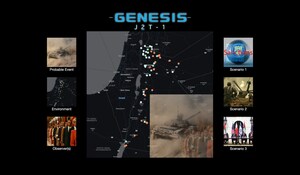NEW YORK, Oct. 22, 2019 /PRNewswire/ -- Jumptuit, Inc., announces the launch of Jumptuit Smart City, delivering smarter data services to all sectors of smart cities through Jumptuit's Regulated Contributory Data Streaming Service.
Jumptuit Smart City is part of The Jumptuit Group encompassing a broad spectrum of data that impacts Smart Citizen and Smart Business services in all sectors including healthcare, education, residential and commercial buildings, transportation and logistics, finance, insurance, energy, utilities and government.
Jumptuit's Regulated Contributory Data Streaming Service increases the velocity of data sharing between smart city sectors and collaboration among smart cities across jurisdictions. An autonomous enforcement of privacy and industry regulations helps to overcome barriers of regional standards, bureaucratic boundaries and regulations that silo data and slow progress and development.
Every city and region has its own distinct set of challenges that encompass the needs, lifestyles and cultural preferences of their people, the economy, government systems, natural resources, geography, infrastructure and operations. Jumptuit Smart City improves the management of smart city planning and resource allocation, addressing the challenges created by growing urban populations and the imperative to better manage limited natural resources, while propelling economic growth and environmental sustainability.
It is comprehensive yet nuanced data that will help cities characterize and prioritize their needs. Jumptuit Smart City matches a city's distinct characteristics with specific smart technology applications and public policy based on a data-driven framework. In a forward-looking approach, Jumptuit Smart City optimizes each city's financial resources and timeline of development in an effort to improve quality of life, with its citizens at the center.
It is critical to clearly understand the individual characteristics of each city/ region when identifying which smart city strategies will have the greatest potential return on investment. To address this, Jumptuit Smart City combines data from a variety of public and private stakeholders in all market sectors and provides a real-time data stream containing highly nuanced insights for smart city stakeholders to consider.
Jumptuit's smart data streaming services accelerate the transformation of large cities into smart cities with minimal disruption to existing infrastructure and systems. By using smarter data to improve urban planning and design, Jumptuit Smart City provides a cost-efficient method for developing cities to keep pace with more developed cities.
"There is no 'one size fits all' when it comes to smart cities; every city and region has distinct characteristics," said Donald Leka, Founder, Chairman and Chief Executive Officer of Jumptuit, Inc. "Stakeholders in smart cities need to be able to prioritize what the needs of their citizens are, carefully consider the many unique characteristics of their cities, including the economy, government systems, natural resources, geography, infrastructure and operations, and identify, based on smarter data, not ideologically-based constructs, what steps to take and technologies to apply to improve the quality of life for their citizens."
Jumptuit Smart City Standards Support
Jumptuit Smart City brings into one data system the international standard concordance of world-wide codes and standardization interests. NAICS (North American Industry Classification System) and SIC (Standard Industrial Classification) in the United States are coordinated with the European Union's NACE (Nomenclature statistique des activités économiques dans la Communauté européenne) and the United Nations' ISIC (International Standard Industrial Classification), as well as being cross-walked with UKSIC (United Kingdom Standard Industrial Classification of Economic Activities) and ANZSIC (Australian and New Zealand Standard Industrial Classification) covering the Australia and New Zealand region. These sets collectively cover more than 160 countries. ISO (International Organization for Standardization) standards are woven throughout these systematized branches, and cross-reference considerations include IEEE (Institute of Electrical and Electronics Engineers) and other manufacturing, government, engineering and human resource-level standardization requirements. Harmonized cross-referencing allows for concordance with systems in the Middle East and Africa, where ground-up Smart Cities are being planned and built. ESG (Environmental, Social & Governance), KLEMS (Capital, Labor, Energy, Materials & Services) and other analytics make possible the seamless integration of human needs and considerations in the Smart City design.
Jumptuit Editorial Contact:
Drew De Risi
Jumptuit
917.650.1359
[email protected]
SOURCE Jumptuit

WANT YOUR COMPANY'S NEWS FEATURED ON PRNEWSWIRE.COM?
Newsrooms &
Influencers
Digital Media
Outlets
Journalists
Opted In





Share this article